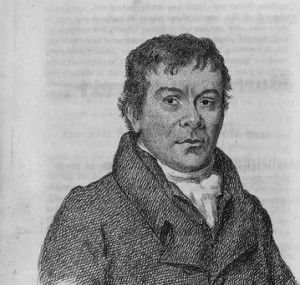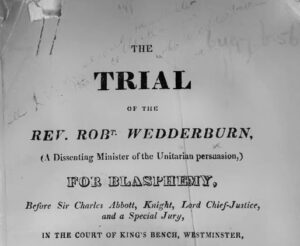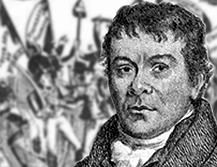Description
 Hear Robert Wedderburn, the son of a Scottish planter in Jamaica by his African slave woman. Wedderburn’s defence plea when being tried for blasphemy in May 1820 discussed Greek etymology and Plutarch. His court appearance persuaded the jury to recommend ‘mercy’, resulting in a sentence of ‘only’ two years in Dorchester jail.
Hear Robert Wedderburn, the son of a Scottish planter in Jamaica by his African slave woman. Wedderburn’s defence plea when being tried for blasphemy in May 1820 discussed Greek etymology and Plutarch. His court appearance persuaded the jury to recommend ‘mercy’, resulting in a sentence of ‘only’ two years in Dorchester jail.
A Unitarian preacher, and follower of Thomas Spence, Wedderburn had described Jesus Christ as a ‘republican’ and ‘reformer’ and compared him with Henry ‘Orator’ Hunt. Hunt was himself at the time in prison following Peterloo. A transcript of Wedderburn’s trial including his complete speech, with learned notes, was simultaneously published. It is an uncompromising defence of freedom in religion and discussion of scripture: ‘Tyrannical and intolerant laws may exist and be enforced in times of darkness and ignorance, but they will be of little effect when once the human mind is emancipated from the trammels of superstition.’
The publication was edited by George Cannon, under the pseudonym Erasmus Perkins: a middle-class, educated radical, Cannon later became a notorious pornographer. He almost certainly wrote some of Wedderburn’s plea—Wedderburn says that he had been unable to write it down himself because his work as a tailor had wrecked his eyesight, and a court clerk read it out.
 Learned footnotes enhance the publication’s air of erudition and authority. Amongst quotations from the Christian Fathers, and references to Roman pagan myth, there is a discussion of the derivation of the two ancient Greek roots of the Greek word blaspheme, and a long note on the Delphic oracle. Plutarch is cited for arguing that it is better to deny the existence of a Supreme Being than to ‘entertain degrading and dishonourable notions of him.’
Learned footnotes enhance the publication’s air of erudition and authority. Amongst quotations from the Christian Fathers, and references to Roman pagan myth, there is a discussion of the derivation of the two ancient Greek roots of the Greek word blaspheme, and a long note on the Delphic oracle. Plutarch is cited for arguing that it is better to deny the existence of a Supreme Being than to ‘entertain degrading and dishonourable notions of him.’
In prison Wedderburn was visited by William Wilberforce and wrote The Horrors of Slavery (1824), drawing on his own childhood memories, especially of his mother and grandmother being flogged. His importance as an early British-Caribbean mixed-race radical is now widely acknowledged.




